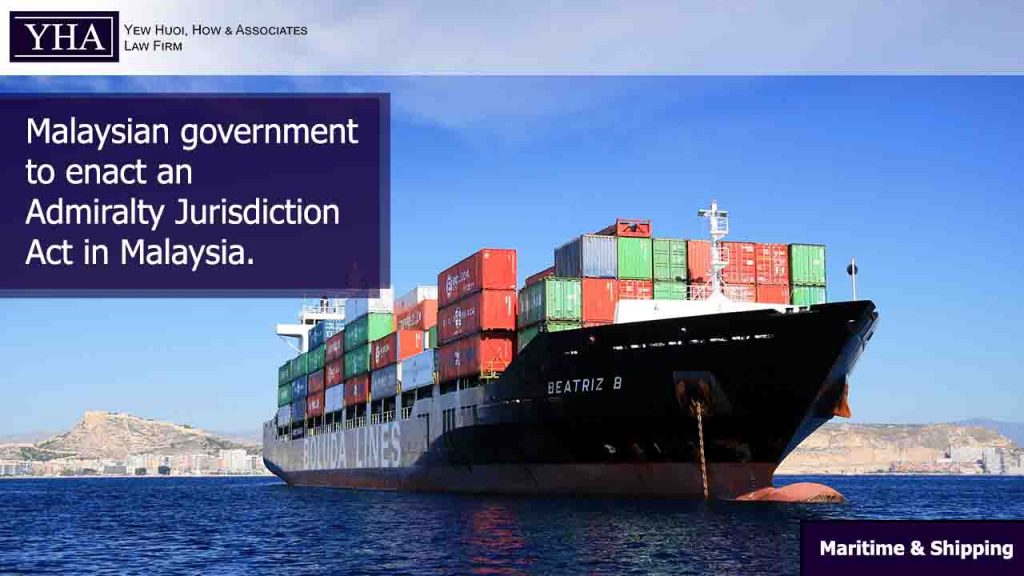The Shipping & Admiralty Law Committee of the Malaysian Bar has recently approved and recommended a draft Bill to the Malaysian government to enact an Admiralty Jurisdiction Act in Malaysia.
Why is this important?
The powers of the court to arrest ships are not based on laws enacted by our Parliament. Rather, it is based on the laws in the United Kingdom (“UK”). Section 24 of our Courts of Judicature Act 1964 (“CJA 1964”) provides that the jurisdiction of the Malaysian High Court to arrest vessel is same as the jurisdiction and authority of the High Court of Justice in England under the UK Supreme Court Act 1981. When the UK Supreme Court Act 1981 was amended by the UK Constitutional Reform Act 2005 and become the Senior Courts Act 1981, all references to the UK Supreme Court Act 1981 is made to the UK Senior Courts Act 1981 (“UK SCA 1981”).
As the laws in UK continue to develop and new Acts of UK Parliament introduced, these new legislations ostensibly apply to Malaysia via Section 24 of the CJA 1964. For example, the UK Civil Jurisdiction and Judgment Act 1982 (“UK CJJA 1982”). The UK CJJA 1982 was introduced in 1991. Section 26 of the UK CJJA 1982 allows the UK courts to arrest ships not only to satisfy arbitration award but also to judgment of legal proceedings in a foreign country.
Arguably, section 26 of the UK CJJA therefore has the effect of extending the jurisdiction of the Malaysian Courts. It must be remembered, prior to the coming into force of the UK CJJA 1982, an arrest can be made only to provide security in respect of the action in rem. This was decided in the case The Vasso [1984] 1 Lloyd’s Rep 235.
In another words, the court would not exercise the power of arrest “in an action in rem” and use that as security for legal proceedings unrelated to the action in rem eg. legal proceeding in a foreign country.
The problem arises when UK CJJA 1982 extended the jurisdiction in rem in UK (which extension ostensibly apply to Malaysia). This extension of jurisdiction in UK CJJA 1982 is not approved by the Malaysian Parliament. It is an Act of the UK Parliament. Arguably, the application of UK Acts of Parliament in such manner would abrogate the function of our own Parliament to enact legislation. Keeping in mind this function is enshrined in our Federal Constitution.
This is particularly so when matters relating to extension of jurisdiction of our court to arrest vessel should be decided by our own legislature. For example, our Parliament is given the chance to approve the extension of admiralty jurisdiction to arrest ships to satisfy an arbitration award pursuant to Section 11 of the Arbitration Act 2005. Similarly, our Parliament should be given the chance to decide whether or not to extend the power to arrest as security for legal proceedings in a foreign country.
Having gained independence for more than half a century, we believe it is time for the country to chart our own trajectory on matters relating to ship arrest and admiralty jurisdiction of the Malaysian court. Malaysian should be given a chance to decide what is best for our own. Since independence, countries like Singapore, Sri Langka, Hong Kong, Australia etc have long enacted and develop its own admiralty jurisdiction legislation.
We hope the recommended Admiralty Jurisdiction bill by the Malaysian Bar will be seriously considered by our government and Parliament. As lawyers, we believe the enactment of our own version of the Admiralty Jurisdiction Act does not hinder our country from absorbing positive influence of evolution of laws of other nations including that of United Kingdom. On the contrary, having our own Admiralty Jurisdiction Act allows our legislature take into consideration laws and regulations of other jurisdiction to strengthen our laws relating to Admiralty Jurisdiction.

